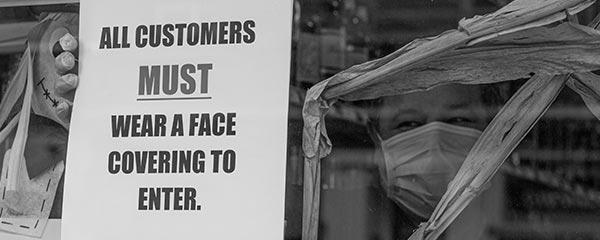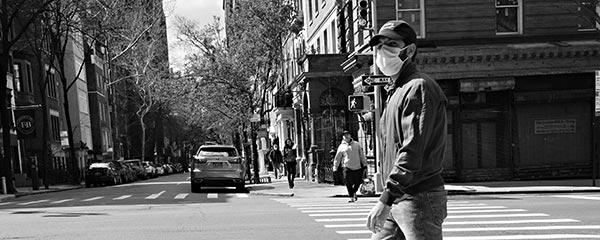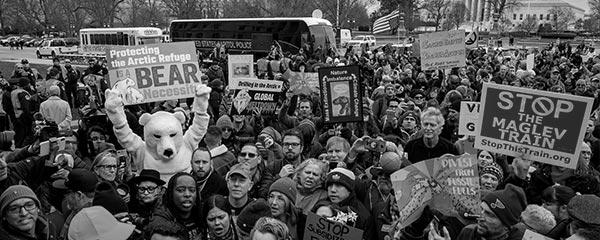Story Highlights
- 32% say face masks are as effective as hand-washing, up from 11% in March
- Face mask usage higher among those who trust scientists, journalists
- Mask users more likely to think it offers personal protection from COVID-19
WASHINGTON, D.C. -- Guidance from public health officials on how to avoid exposure to the novel coronavirus has evolved over the course of the crisis in the U.S.
At first, the advice centered on hand-washing -- but more recently, officials have urged Americans to wear masks or face coverings in public. Consequently, increasing numbers of Americans have adopted the use of face masks to try to combat the spread of COVID-19. Yet, two recent ║┌┴¤═°/Knight Foundation surveys show the new advice appears to have introduced some confusion about the reasoning behind the recommendation to wear face coverings in public.
In late February, at the early stage of the U.S. outbreak, Surgeon General Dr. Jerome Adams implored Americans not to stockpile masks, saying they are not effective in preventing the general public from catching the disease and need to be saved for healthcare workers on the front lines. Along with the U.S. Centers for Disease Control and Prevention (CDC), Adams encouraged the public to instead wash their hands often and thoroughly. In March, 88% of Americans said hand-washing is more effective than wearing surgical masks, with most of the rest (11%) saying they were equally effective.
| Mar 17-30 | Apr 14-20 | ||||||||||||||||||||||||||||||||||||||||||||||||||||||||||||||||||||||||||||||||||||||||||||||||||
|---|---|---|---|---|---|---|---|---|---|---|---|---|---|---|---|---|---|---|---|---|---|---|---|---|---|---|---|---|---|---|---|---|---|---|---|---|---|---|---|---|---|---|---|---|---|---|---|---|---|---|---|---|---|---|---|---|---|---|---|---|---|---|---|---|---|---|---|---|---|---|---|---|---|---|---|---|---|---|---|---|---|---|---|---|---|---|---|---|---|---|---|---|---|---|---|---|---|---|---|
| % | % | ||||||||||||||||||||||||||||||||||||||||||||||||||||||||||||||||||||||||||||||||||||||||||||||||||
| Hand-washing more effective | 88 | 68 | |||||||||||||||||||||||||||||||||||||||||||||||||||||||||||||||||||||||||||||||||||||||||||||||||
| Mask equally or more effective | 11 | 32 | |||||||||||||||||||||||||||||||||||||||||||||||||||||||||||||||||||||||||||||||||||||||||||||||||
| GALLUP/KNIGHT FOUNDATION, 2020 | |||||||||||||||||||||||||||||||||||||||||||||||||||||||||||||||||||||||||||||||||||||||||||||||||||
But on April 3, the CDC reversed course on its face mask guidelines, following growing evidence that presymptomatic and asymptomatic carriers could transmit the virus more readily than previously thought. The new recommendation called for the use of masks or cloth face coverings for Americans when they are in public and unable to follow social distancing guidelines in order to prevent the spread to others, including from unknowingly infected carriers.
The ║┌┴¤═°/Knight Foundation April 14-20 survey finds a sharp drop in the percentage of U.S. adults who say hand-washing is more effective, to 68%, and a concomitant increase in the percentage who say hand-washing and wearing masks are equally effective.
While the changing guidelines have introduced some confusion, the degree of change across key demographic subgroups (including party identification, news media diet and amount of news consumption) is not substantial.
Notably, however, older Americans' views are more likely to have shifted while younger adults remain as likely as before to say hand-washing is more effective at prevention than wearing a mask.
| Mar 17-30 | Apr 14-20 | ||||||||||||||||||||||||||||||||||||||||||||||||||||||||||||||||||||||||||||||||||||||||||||||||||
|---|---|---|---|---|---|---|---|---|---|---|---|---|---|---|---|---|---|---|---|---|---|---|---|---|---|---|---|---|---|---|---|---|---|---|---|---|---|---|---|---|---|---|---|---|---|---|---|---|---|---|---|---|---|---|---|---|---|---|---|---|---|---|---|---|---|---|---|---|---|---|---|---|---|---|---|---|---|---|---|---|---|---|---|---|---|---|---|---|---|---|---|---|---|---|---|---|---|---|---|
| % | % | ||||||||||||||||||||||||||||||||||||||||||||||||||||||||||||||||||||||||||||||||||||||||||||||||||
| 18-34 | 88 | 85 | |||||||||||||||||||||||||||||||||||||||||||||||||||||||||||||||||||||||||||||||||||||||||||||||||
| 35-49 | 94 | 74 | |||||||||||||||||||||||||||||||||||||||||||||||||||||||||||||||||||||||||||||||||||||||||||||||||
| 50-64 | 92 | 65 | |||||||||||||||||||||||||||||||||||||||||||||||||||||||||||||||||||||||||||||||||||||||||||||||||
| 65+ | 83 | 46 | |||||||||||||||||||||||||||||||||||||||||||||||||||||||||||||||||||||||||||||||||||||||||||||||||
| GALLUP/KNIGHT FOUNDATION, 2020 | |||||||||||||||||||||||||||||||||||||||||||||||||||||||||||||||||||||||||||||||||||||||||||||||||||
Americans' Face Mask Habits
A separate survey question asked Americans how often they wore a mask or face covering when out in public in the past seven days. Those who have left their house in the past seven days divide equally in saying they always wore a mask in public (36%), sometimes did (32%) and never did (31%).
In line with findings from other surveys asking about face covering habits, Democrats, women and those with higher levels of education are more likely to say they "always" or "sometimes" wore a mask in the past seven days.

Beyond these demographic differences, some other factors are correlated with face mask usage. For instance, U.S. adults who are heavy news users, those who say they trust scientists and journalists "a lot," and those who live in a county that has recorded at least one coronavirus-related death are more likely than their counterparts to say they always or sometimes wore a mask in public in the past seven days.

Similarly, Americans who think wearing a mask is as effective as hand-washing at preventing healthy people from getting COVID-19 are more likely to say they wore a face covering in the past seven days, compared with those who believe hand-washing is more effective (75% vs. 66%).
Adherence to the CDC recommendation to wear face masks is most evident among older Americans who believe wearing a mask is as effective as hand-washing.

Bottom Line
The U.S. medical community's guidelines about face coverings evolved between March and April as new information emerged about the prevalence of asymptomatic and presymptomatic carriers and how the virus can spread.
The motivation behind the shift in guidance centered on preventing the spread of the virus from carriers, but the announcement introduced some confusion about why people should wear masks. Some members of the public seem to have falsely inferred that it also implies that wearing a face mask is an effective way to prevent healthy people from catching the disease. Yet, there is no definitive scientific evidence to support or refute this.
Regardless, the announcement of these new guidelines succeeded in increasing face mask usage in public spaces. Today, a majority of Americans say they always or sometimes wear a mask in public, especially those who consume a great deal of news and who trust professionals like scientists and journalists.




